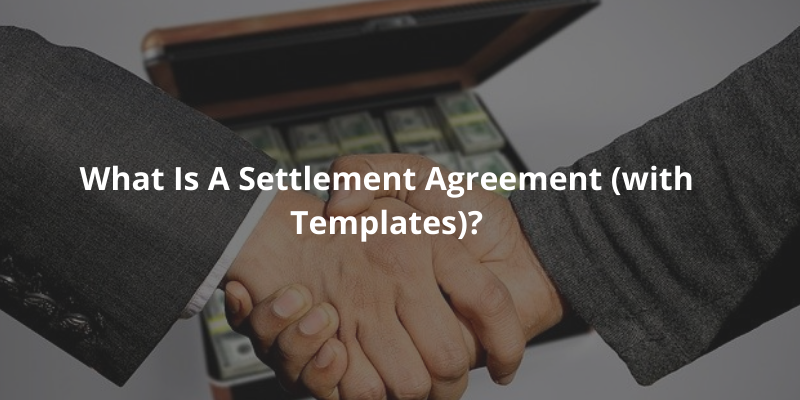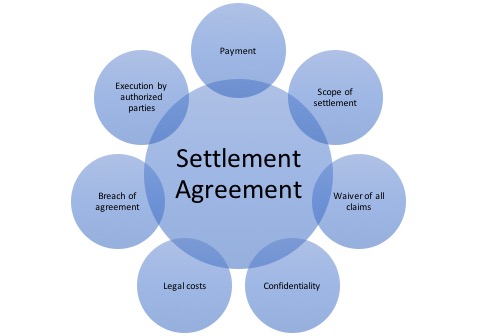Settlement Agreements Demystified: Understanding the Legalities and Benefits
17 Jan 2024
27 Nov 2020
min read

Settlement agreements, otherwise known as compromise agreements, are an effective way of resolving disputes between employer and employee. Settlement agreements are mutual, legally binding contracts between the two parties which help settle any claims an employee has against the employer. This enables parties to settle a dispute in a confidential way without taking legal action through the court system. Once the parties reach a settlement on the dispute through reconciliation, compromise, or other forms of alternate dispute resolution, they will then record the terms of the settlement in writing and have all the parties sign it such that the settlement agreement is binding.
What is a settlement agreement?
A settlement agreement is a legally binding contract that ensures the full and final settlement of all the claims one party has against the other in return for a certain consideration from the other party.
Simply put, under a settlement agreement, compensation is given by one party to the other and in exchange, the other party agrees to waive any claims associated with the dispute.
The most common types of settlement agreements are:
1. Employment Settlement Agreement
2. Debt Settlement Agreement
3. Traffic Accident Settlement Agreement
4. Post Nuptial Settlement Agreement
5. Intellectual Property Settlement Agreement
What is the purpose of a settlement agreement?
As the name suggests, the purpose of the agreement is to settle the dispute once and for all without the need to commence legal proceedings in court.
What are the benefits of a settlement agreement?
The traditional ways of resolving disputes such as litigation are high pressured, time-consuming, and costly. It is therefore much preferred for parties to reach a compromise out of court and record it in the form of a settlement agreement. Settlement agreements are a quick alternative to resolving disputes by taking legal action, in a manner beneficial to both parties. Once the compromise is reached, it is only a matter of drawing up an agreement and recording the settlement terms – a process that doesn’t take more than a few days.
What to include in a settlement agreement?
Settlement agreements are like any other regular contract. The essential requirements for a contract to be valid and enforceable therefore apply i.e., there must an offer, acceptance, consideration, an intention to create legal creations, the party's capacity to enter a contract and certainty on the essential terms of the contract.
To understand the essential requirements for a valid contract, read more here.
There are a few key provisions that must be included in the settlement agreement:

(a) Payment terms: the amount and the timeline for making payments
(b) Scope of settlement: enlist all the terms of settlement to avoid any ambiguity
(c) Waiver: enlist all the claims of the party that are settled/released and by claims that are reserved
(d) Confidentiality: if the parties are supposed to keep the settlement terms confidential
(e) Legal costs: if a party is liable to pay for the legal costs incurred by the other party for instance solicitor fees for seeking legal advice on the settlement agreement
(f) Breach of contract: what are the consequences of a breach of contract?
(g) Execution of a contract: the parties have the requisite authority to sign the agreement.
Do you have to sign the settlement agreement?
No, settlement agreements are completely voluntary. The terms must be agreed to by the parties and no party can be forced to sign a settlement agreement.
What are the common types of a settlement agreements?
1. Employment Settlement Agreement
An employment settlement agreement is a legally binding agreement between the employer and employee where the employee agrees to settle all employment claims against the employer usually in return for financial compensation.
In simple terms, the employee agrees to not pursue any claim against the employer in the employment tribunal after signing the settlement agreement. It is a way to settle an employer-employee dispute in the manner mutually agreed by the parties.
What to include in the employment settlement agreement?
The settlement agreement records the terms and conditions of the settlement reached between the parties. Some of the key elements of the agreement are:
-
the list of claims the employee agrees to waive;
-
details of financial payments to be made by the employer;
-
confidentiality terms to ensure that not only the terms and conditions but also the existence of a settlement agreement is not disclosed to a third party;
-
a contribution by the employer towards the legal fees;
-
any demand for a ‘good reference’ from the employer;
-
status of the employment contract i.e. whether the employment contract gets terminated or not.
-
a confirmation that independent legal advice on the settlement agreement was sought by the employee.
Why should you enter into an employment settlement agreement?
Pursuing a claim in an employment tribunal can be expensive and time-consuming. Plus, there is always a risk of losing a claim in the tribunal. On the other hand, a settlement agreement benefits both the employer and employee as the settlement terms are mutually agreed upon by the parties.
For employers, it gives them an opportunity to get rid of a troublesome employee with the guarantee that no claim will be made by the employee through the employment tribunal after the termination of employment. Also, the terms of the settlement will remain confidential between the employer and employee.
For an employee, it gives them more control over the outcome of the settlement as the terms are mutually agreed upon. The employee may also decide to demand a good reference letter from the employer, which will help while they seek new employment; it might result in a better financial payment than what will come out of a claim in an employment tribunal.
Does an employee need legal advice on settlement agreements?
To ensure the settlement agreement is legally binding, the employee must have the agreement reviewed by a qualified lawyer/solicitor, upon which they will receive a certificate confirming that he/she received the requisite legal advice on the terms of the settlement.
The employee must receive independent legal advice on the:
- effects of the settlement agreement on his/her rights to pursue a claim in the employment tribunal;
- whether the settlement package is fair or not.
It is important that the legal advice is received from an independent advisor for the advice and the settlement agreement to be valid.
2. Debt Settlement Agreement/Letter
The debt settlement agreement is a contract signed between a debtor and creditor to settle a debt. "Debtor" refers to any person who owes money, and "creditor" refers to any person who is being owed the money. Under a debt settlement agreement, the creditor agrees to receive a one-time payment as a full and final settlement of the entire debt and loses all claims associated with the remaining debt.
Debtors sometimes will try to pay less than the full amount through a "full and final settlement". If a debtor is unable to pay the debt, he/she may offer to the creditor a lump sum amount as a “full and final settlement" of the entire balance the debtor owed on the debt. In exchange for a one-time payment, the creditor agrees to write off the remaining debt.
The "full and final settlement" trap is often used by the debtor, where the debtor makes a written or oral statement that the payment now settles the entire debt. It can also take a more formal form, such as the small print at the bottom of a remittance statement stating that the partial repayment is the “full and final settlement”. If the creditor accepts a payment made at the same time, one may be deemed to have accepted a "write-off" offer on the remaining debt.
Is it beneficial for a creditor?
As a creditor, you need to respond to a full and final settlement very carefully. In relation to a debt, you should assess the debtor's ability to pay before agreeing to any full and final settlement or payment from the debtor. In case of a claim, you should also assess the merit of your case and the possibility of you winning a recovery claim in the court /arbitration tribunal and recovering the full amount before accepting a full and final settlement of all claims.
What to include in the debt settlement agreement/letter?
A debt settlement can be agreed upon in the form of an agreement or a simple letter. It should state the outstanding balance owed to the creditor, the amount agreed as the full and final settlement of the debt, and payment terms such as mode of payment, schedule for making the payment and consequences of default/delay in payment.
We have created a settlement template for you to customise and use: The Debt Settlement Letter template. This letter to the creditor can be used by a debtor, whereby a debtor is looking to request a new discounted repayment amount on outstanding debt.

3. Traffic Accident Settlement Agreement/Letter
Private settlement after a traffic accident is generally the preferred method of settling damages and injury, in contrast to filing a police report or pursuing a claim in court.
Under a private settlement, the party at fault will pay compensation for the damages suffered by the injured party, releasing the party at fault from any claim associated with the accident.
Is the traffic accident settlement agreement/letter binding?
Yes, settlement agreements are binding contracts that result in the injured party losing their legal rights to seek damages in court. It is therefore advisable that you seek legal advice before agreeing to enter a settlement agreement as the agreement cannot be invalidated further down the road.
What to include in a settlement agreement/letter?
As we have touched on, settlement agreements can be presented as simple letters or agreements. Either way, certain pieces of information must include: the name and contact details of the parties (at fault and injured party); compensation amount; details of the accident (date/time/location); and that both the parties will not make any police report of the accident and not claim any compensation from the insurance company.
We have created some traffic accident settlement templates for you to customise and use -
Traffic Accident Full and Final Settlement Agreement (Neutral - No Personal Injury) - This template is drafted in neutral form i.e. both parties confirm that no personal injury is involved in the accident and neither party will make a complaint to the Police.
Traffic Accident Full and Final Settlement Agreement (Driver not at fault - No Personal Injury - This template is drafted in favour of the driver who is not at fault.
Traffic Accident Full and Final Settlement Agreement (Driver at fault - No Personal Injury) - This template is drafted in favour of the driver at fault and will be fully released from all claims.
4. Post Nuptial Settlement Agreement
Postnuptial agreements are common amongst couples after marriage. It enables them to decide or settle matters relating to their financial rights and asset ownership in the event of a divorce. A postnuptial settlement can help to speed up the divorce proceedings and protect the wealth of the parties thereto.
Are postnuptial agreements legally binding?
Yes, postnuptial agreements are binding and enforceable. However, they are not always upheld as the courts can be quite strict about how the agreement should be drafted and signed by the parties. For instance, a pre-nuptial agreement may be nullified if:
-
not in compliance with the relevant state laws such as inheritance, and child custody;
-
unreasonable and unfair to one party;
-
the parties are not honest with the disclosure of all the assets
-
the contract was signed under coercion
Therefore, it is advisable that you seek advice from a qualified lawyer/solicitor to understand the legal aspects and requirements of a postnuptial settlement agreement.
What does a postnuptial agreement include?
Generally, the agreement covers matters relating to child custody, property ownership, spousal support, and support for children in the event of divorce.
We have created the following postnuptial settlement template -
Post Nuptial Financial Agreement - Full and Final Settlement (No Child) - The agreement sets out how the ownership of the cohabitation property is to be transferred, the tax arrangement and also releasing each other's right to make an application in relation to the estate of the other.
5. Intellectual Property Settlement Agreements
Settlement agreements can also be entered between the parties to resolve disputes relating to intellectual property rights. It is a faster way of resolving infringement matters compared to the traditional procedure of filing administrative complaints and litigation in courts.
In the case of copyright infringement, the settlement agreement is executed between the beneficial owner of the copyright and the party who has allegedly infringed the copyright. The agreement accomplishes the following:
-
records the alleged party’s confirmation of unauthorised use and infringement of copyright;
-
formally recognises the rights of the copyright owner.
-
Requires the alleged party to cease and desist dealings with the infringing works and take immediate steps to remove or obliterate the infringing works.
Trademark co-existence disputes can also be settled by way of settlement agreements. For instance, the parties may agree to allow their respective trademarks to co-exist and agree to not oppose or challenge the trademark registration application.
We have created the following settlement template to help you with IP settlement matters -
Full and Final Settlement Agreement – Copyright Infringement (Artistic works) - If a settlement agreement is needed to be made between the beneficial owner of the copyright in original artistic works and the party who has allegedly infringed the copyright, this settlement agreement template may be used.
Full and Final Settlement Agreement - Trade Mark - Coexistence - Full and Final Settlement Agreement between two companies in regards to the use of trademarks owned by the first company with the application for pending similar trademarks by the second company. The second company agrees to certain conditions in return for the owner withdrawing its opposition.
Please note that this is a general guide on the most common settlement agreements. This does not constitute legal advice. As each dispute, may be different, you may want to speak to your local lawyer.
Keywords:



